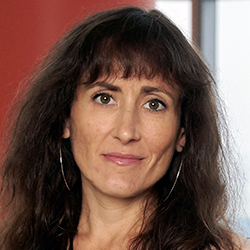Brenna Argall Receives CAREER Award
The five-year, $525,000 grant will help people with a wide variety of disabilities who can benefit from robotic devices.
Northwestern Engineering professor Brenna Argall has received the prestigious Faculty Early Career Development (CAREER) Award from the National Science Foundation, a grant that supports exceptional young faculty. The award is designed to support promising young faculty members who exemplify the role of teacher-scholar through the combination of outstanding research and education.
 Argall, assistant professor of electrical engineering and computer science and of physical medicine and rehabilitation at the Rehabilitation Institute of Chicago, conducts research that leverages the autonomy of robots to help people who may have sensory, motor or cognitive impairments.
Argall, assistant professor of electrical engineering and computer science and of physical medicine and rehabilitation at the Rehabilitation Institute of Chicago, conducts research that leverages the autonomy of robots to help people who may have sensory, motor or cognitive impairments.
The five-year, $525,000 grant will help people with a wide variety of disabilities who can benefit from robotic devices. Paradoxically, the more severe a person’s motor impairments, “the harder it is for them to operate the very machines meant to enhance their quality of life,” Argall said.
Her team is spearheading a new area of research that explores the intersection of autonomous robots and rehabilitation. “We work to incorporate robotics autonomy and intelligence into assistive machines, offloading some of the control burden from the user to the machine,” she said.
Robots that provide physical assistance to people need to adapt to the many different needs of their users. In addition, the way a patient interacts with the robot will also change over time. Argall’s algorithms will take these dynamic factors into account.
The advances can help patients with a wide variety of disabilities, including spinal cord injuries, traumatic brain injuries, stroke survivors, amyotrophic lateral sclerosis (ALS), multiple sclerosis and Parkinson’s disease.
“The work is poised to transform rehabilitation science by treating motor impairments as an advantage rather than a constraint,” she said.